Light Therapy and Laser Therapy May Be Safer, but Both Can Reduce Folic Acid Levels. Proceed with Caution and Always Consult Your Physician.

The Essential Info
Acne sometimes flares during pregnancy, particularly during the third trimester.
However, treating acne during pregnancy with traditional medications is difficult because:
- Several common prescription acne medications are proven to be unsafe during pregnancy.
- It is hard to know for sure how safe acne medications are because it is not ethical to perform studies on pregnant women.
Therefore, women often look toward alternative treatments that do not include any oral or topical medications. Two common alternative treatments that women and their doctors explore are:
- Light Therapy:This refers to regular light therapy that just involves the use of light. A more invasive type of light therapy, called photodynamic therapy, which involves topical medications followed by the use of light, is not safe during pregnancy.
- Laser Therapy: Laser therapy may also help reduce acne during pregnancy.
Important Notes on Light Therapy and Laser Therapy:
Folic Acid: Light and lasers can reduce folic acid levels in the body. If you are treated with any kind of light or laser therapy, make sure your doctor tests the levels of folic acid in your blood and be certain to have a conversation with your doctor about folic acid supplementation. Important: Never supplement with folic acid without talking to your doctor since too much is toxic.
Skin Oil Glands: In some studies, both light and laser therapy have produced longer-term clearing of acne months after treatment ends. This is likely due to skin oil glands becoming semi-permanently, or perhaps permanently altered by the light or laser therapy. However, this begs a question. What does permanently altering skin oil glands lead to in the following decades of life? Will it cause the skin to prematurely age, or will it lead to any other issues? This research has not been performed.
Risky alternative therapies should be avoided, including:
- Calorie restriction or other radical changes to the diet
- Herbal Treatments
Always Consult Your Doctor: If you want to treat your acne during pregnancy, never enter into any treatment before speaking with your doctor.

The Science
- Pregnancy and Acne
- Challenges of Treating Acne During Pregnancy
- Alternative Treatment Options for Acne During Pregnancy
- Always Consult Your Doctor
First, let’s look at how pregnancy can affect acne, and then we will consider both the challenges of treating acne during pregnancy and the available alternative treatments.
Pregnancy and Acne
Pregnancy affects acne in unpredictable ways. While most women experience improvement in their acne during pregnancy, others experience acne flares, or even a first episode of acne. This is because skin oil glands become more active during the second half of pregnancy, especially during the third trimester.1
Women who have the following risk factors might be more prone to severe acne during pregnancy:
- Younger age: Severe acne might be more likely in pregnant women who are younger than 25 years old
- First-time pregnancy: Women who are pregnant for the first time might be more likely to develop severe acne
- Irregular periods: Women who had irregular menstrual cycles prior to pregnancy might be more likely to develop severe acne in pregnancy
- Polycystic ovary syndrome (PCOS): Women with polycystic ovary syndrome might be more prone to severe acne in pregnancy
- Excess weight: Being overweight might predispose pregnant women to severe acne
- Low fetal weight: Pregnant women carrying an underweight fetus might be more prone to severe acne
- Expecting a girl: Women pregnant with a female baby might be more likely to develop severe acne2
Challenges of Treating Acne During Pregnancy
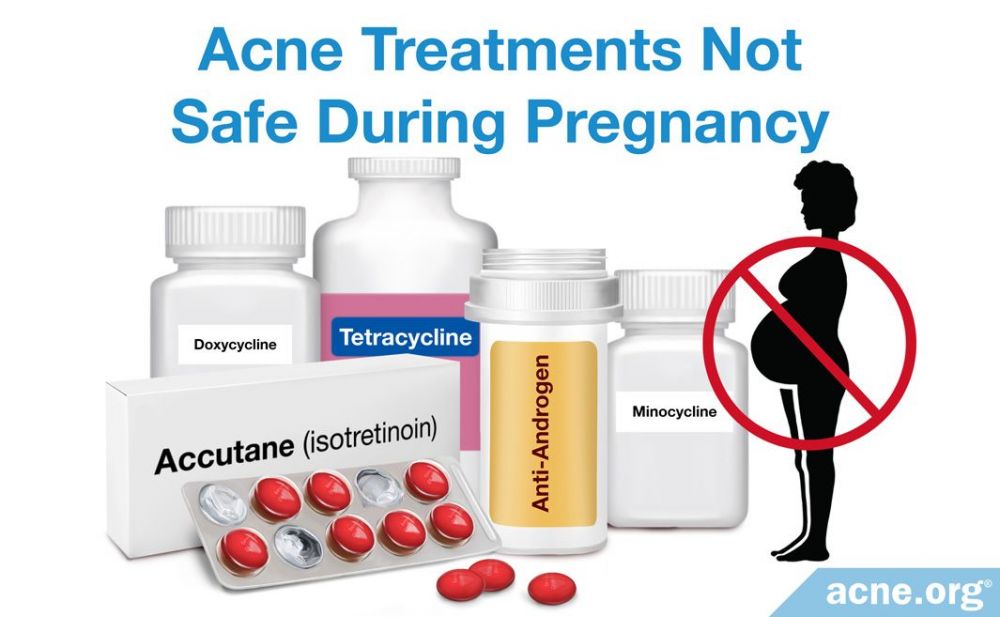
Treating acne during pregnancy is difficult for the following reasons:
- There is little scientific evidence concerning the safety of various acne medications during pregnancy because, for ethical reasons, clinical studies are not performed on pregnant women.2
- Some prescription acne medications, such as isotretinoin (Accutane®), anti-androgens (spironolactone, cyproterone acetate), and oral antibiotics (tetracycline, minocycline, doxycycline) are unsafe for pregnant women because they can harm the fetus.2,3
- Doctors are cautious when prescribing other medications, such as topical retinoids (tretinoin, adapalene, and tazarotene) to pregnant women.
- Even over-the-counter acne medications have not been studied sufficiently in pregnant women.
Because of the potential risks of acne medications to the fetus, some researchers recommend aiming for symptom improvement rather than clearing of the skin during pregnancy.3
Alternative Treatment Options for Acne During Pregnancy
Alternative treatments available for acne during pregnancy include:
- Light therapy
- Laser therapy
Light Therapy
Light therapy is a somewhat promising treatment for acne that may be safer to use during pregnancy. The idea is that acne bacteria absorb the light, which triggers chemical reactions that ultimately kill the bacteria. There are several types of light therapy, including:
- Blue light
- Red light
- Blue + red light3,5,6
Studies using these light therapies demonstrate promising results.
Expand to read details of studies
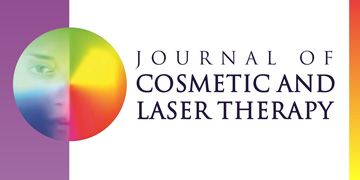
A 2006 study in the Journal of Cosmetic and Laser Therapy found that a combination of blue and red light therapy reduced acne lesions by 46% after four weeks and by 81% after 12 weeks.7
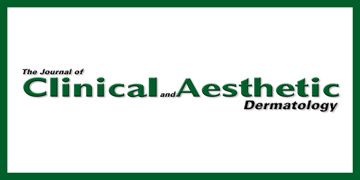
A small 2009 study published in The Journal of Clinical and Aesthetic Dermatology showed a significant decrease in acne lesions after eight weeks of blue light therapy.8
One other form of light therapy is also available, called Narrowband-ultraviolet B phototherapy (NBUVB). Doctors use narrowband-ultraviolet B phototherapy to treat other skin conditions, such as psoriasis, during pregnancy. However, there is only a single case report of a woman whose acne was successfully treated with NBUVB during her pregnancy.
Expand to read details of case report
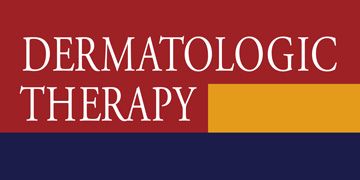
As a 2013 article in Dermatologic Therapy reports, “In one case report, a woman who was 5 months pregnant with new onset acne vulgaris was treated with escalating doses of NBUVB phototherapy three times weekly for 2 months, eventually leading to resolution of most of her inflammatory papules and pustules.”3
Special note on photodynamic therapy: Photodynamic therapy is another light treatment for acne in which a substance containing a photosensitizer, is put on the skin immediately before light treatment. The photosensitizer helps the skin absorb light better. However, the photosensitizing substances that are commonly used along with the PDT are not safe to use during pregnancy. Therefore, PDT should not be used during pregnancy.3
Laser Therapy
Laser therapy is another somewhat promising treatment for pregnant women who are struggling with acne. Several studies have shown laser treatment to be effective in treating acne, with study participants experiencing a broad range of improvement (36% – 83%) in acne symptoms. However, similar to light therapy, laser therapy alone does not completely clear acne.3,9-17
Laser therapy generally is safe. However, it is important to note that there have not been studies looking specifically at the safety or effectiveness of laser in pregnant patients.3
Important Warning about Folic Acid: All of these forms of light treatment, including laser therapy, which is a form of light, can reduce the level of folic acid in the body, and maintaining an adequate level of folic acid in the blood is vital during pregnancy. Therefore, women who are pregnant or plan on becoming pregnant and are treated with any form of light therapy should have the level of folic acid in their blood tested and take folic acid supplements if necessary.3
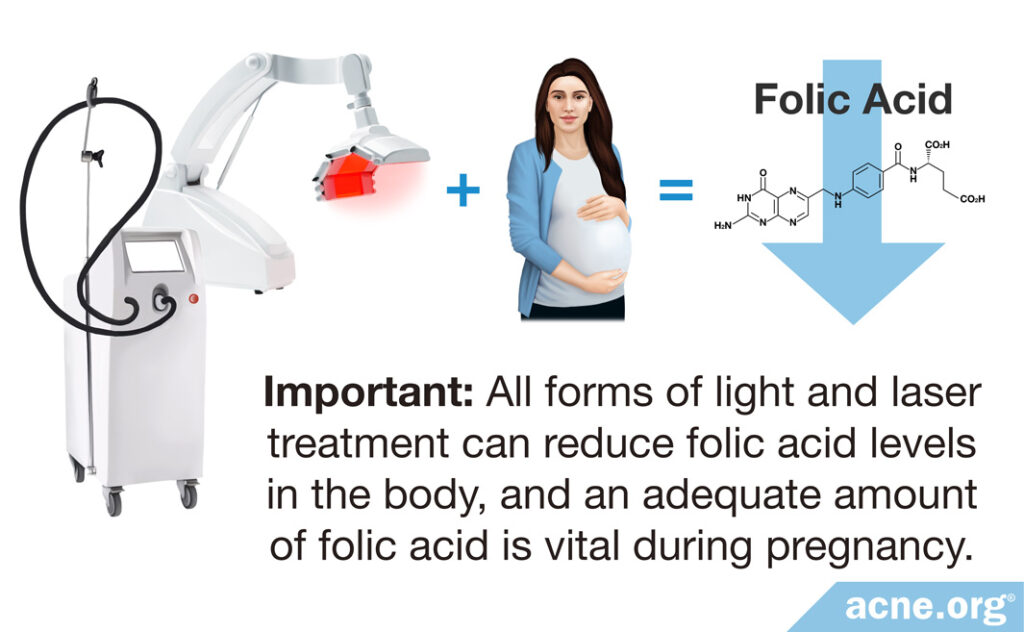
Dietary Restriction – Be Careful
Eating healthy is always a good idea, particularly during pregnancy. A diet full of colorful fruits and vegetables, omega-3 fats, and whole, unprocessed foods, may lead to less acne symptoms. However, restricting calories or making radical changes to the diet during pregnancy can cause problems and is not recommended.6
Herbal Treatments – Avoid
People have used different herbal treatments to treat acne, but there is little evidence concerning their effectiveness and safety. In addition, over-the-counter herbal remedies are not regulated in the United States, and their ingredients vary among products. Herbal products are not recommended to treat acne during pregnancy for these reasons.6
Always Consult Your Doctor
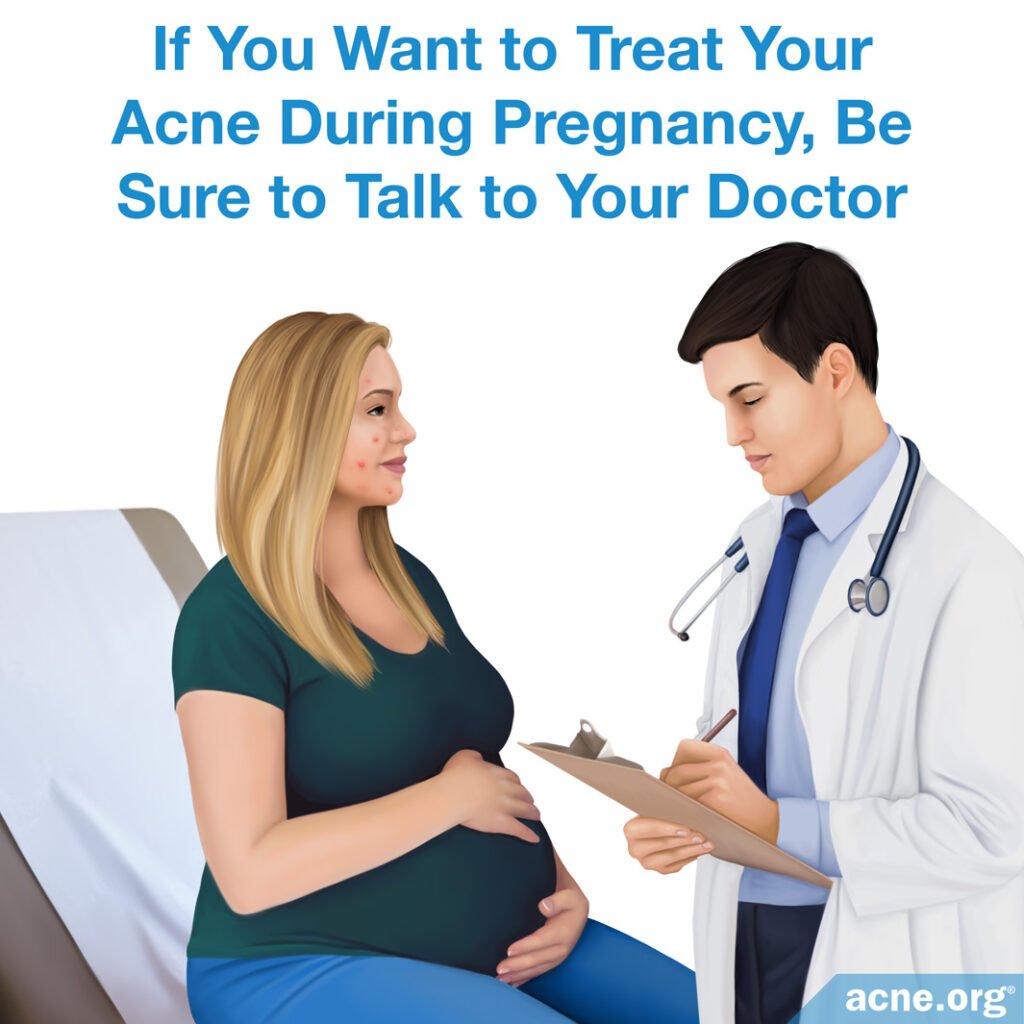
The number of acne treatments available to pregnant women is limited, and evidence on the safety of many treatments during pregnancy is still lacking. Therefore, if you want to treat your acne during pregnancy, be sure to talk to your doctor. He or she will recommend a safe treatment based on your medical history and preferences.18
Light and laser therapies likely are safe to use during pregnancy, but it is unclear how effective they are. And remember, if you are treated with any kind of light therapy, make sure your doctor tests the levels of folic acid in your blood so that you can take folic acid supplements as necessary. But also be careful to never supplement with folic acid without talking to your doctor, as too much is toxic.
References
- Yang, C. S., Teeple, M., Muglia, J. & Robinson-Bostom, L. Inflammatory and glandular skin disease in pregnancy. Clin Dermatol 34, 335 – 343 (2016). https://www.ncbi.nlm.nih.gov/pubmed/27265071
- Ly, S., Kamal, K., Manjaly, P., Barbieri, J. S. & Mostaghimi, A. Treatment of acne vulgaris during pregnancy and lactation: A narrative review. Dermatol Ther (Heidelb) 13, 115-130 (2023). https://pubmed.ncbi.nlm.nih.gov/36447117/
- Pugashetti, R. & Shinkai, K. Treatment of acne vulgaris in pregnant patients. Dermatol Ther 26, 302 – 311 (2013). https://www.ncbi.nlm.nih.gov/pmc/articles/PMC5555287/
- Chien, A. L., Rainer, B., Sachs, D. L. & Helfrich, Y. R. Treatment of acne in pregnancy. J Am Board Fam Med 29, 254 – 262 (2016). https://www.ncbi.nlm.nih.gov/pubmed/26957383
- Kong, Y. L. & Tey, H. L. Treatment of acne vulgaris during pregnancy and lactation. Drugs 73, 779-787 (2013). https://pubmed.ncbi.nlm.nih.gov/23657872/
- Meredith, F. M. & Ormerod, A. D. The management of acne vulgaris in pregnancy. Am J Clin Dermatol 14, 351 – 358 (2013). https://www.ncbi.nlm.nih.gov/pubmed/23996075
- Goldberg, D. J. & Russell, B. A. Combination blue (415 nm) and red (633 nm) LED phototherapy in the treatment of mild to severe acne vulgaris. J Cosmet Laser Ther 8, 71 – 5 (2006). https://www.ncbi.nlm.nih.gov/pubmed/16766484
- Gold, M. H., Andriessen, A., Biron, J. & Andriessen, H. Clinical efficacy of self-applied blue light therapy for mild-to-moderate facial acne. J Clin Aesthet Dermatol 2, 44 – 50 (2009). https://www.ncbi.nlm.nih.gov/pubmed/20729943
- Kim, B. J. et al. Pilot study on photodynamic therapy for acne using indocyanine green and diode laser. J Dermatol 36, 17 – 21 (2009). https://www.ncbi.nlm.nih.gov/pubmed/19207432
- Tzung, T. Y., Wu, K. H. & Huang, M. L. Blue light phototherapy in the treatment of acne. Photodermatol, Photoimmunol Photomed 20, 266 – 9 (2004). https://www.ncbi.nlm.nih.gov/pubmed/15379878
- Ross, E. V. Optical treatments for acne. Dermatol Ther 18, 253 – 66 (2005). https://www.ncbi.nlm.nih.gov/pubmed/16229726
- Haedersdal, M., Togsverd-Bo, K. & Wulf, H. C. Evidence-based review of lasers, light sources and photodynamic therapy in the treatment of acne vulgaris. J Eur Acad Dermatol Venereol 22, 267 – 278 (2008). https://www.ncbi.nlm.nih.gov/pubmed/18221341
- Seaton, E. D. et al. Pulsed-dye laser treatment for inflammatory acne vulgaris: Randomised controlled trial. Lancet 362, 1347 – 52 (2003). https://www.ncbi.nlm.nih.gov/pubmed/14585635
- Elman, M. & Lask, G. The role of pulsed light and heat energy (LHE) in acne clearance. J Cosmet Laser Ther 6, 91 – 5 (2004). https://www.ncbi.nlm.nih.gov/pubmed/15203999
- Prieto, V. G., Zhang, P. S. & Sadick, N. S. Evaluation of pulsed light and radiofrequency combined for the treatment of acne vulgaris with histological analysis of facial skin biopsies. J Cosmet Laser Ther 7, 63 – 8 (2005). https://www.ncbi.nlm.nih.gov/pubmed/16537210
- Jung, J. Y. et al. Prospective randomized controlled clinical and histopathological study of acne vulgaris treated with dual mode of quasi-long pulse and Q-switched 1064-nm Nd:YAG laser assisted with a topically applied carbon suspension. J Am Acad Dermatol 66, 626 – 33 (2012). https://www.ncbi.nlm.nih.gov/pubmed/22033354
- Lee, E. J. et al. An open-label, split-face trial evaluating efficacy and safety of photopneumatic therapy for the treatment of acne. Ann Dermatol 24, 280 – 6 (2012). https://www.ncbi.nlm.nih.gov/pmc/articles/PMC3412236/
- Tan, A. U., Schlosser, B. J. & Paller, A. S. A review of diagnosis and treatment of acne in adult female patients. Int J Womens Dermatol 4, 56-71 (2017). https://pubmed.ncbi.nlm.nih.gov/29872679/
The post Alternative Treatment Options for Acne During Pregnancy appeared first on Acne.org.
